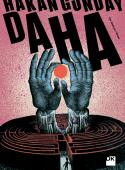
MORE - Hakan Günday

The novel is based on the relationship between the individual and the crowd: His father’s involvement in human trafficking introduces a nine-year-old boy to the phenomenon of illegal migration. His upbringing forces him to witness the crushing reality of socio-economic inequality.
A young boy charged with the basic needs of illegal refugees hiding in a storeroom, and his relationship with these desperate people, whom he victimises: a demonstration of an individual’s tyranny over the crowd simply because the conditions allow it.
Later, the boy is trapped by the dead bodies of the same people as a result of a freak accident when the lorry transporting the refugees hurtles down the cliff. At this point, the crowd symbolically buries the individual, turning him into a prisoner.
In time, the boy develops an extreme form of social phobia as a direct, but delayed, result of having been trapped by those bodies. The individual has severed ties with society.
However, the boy wants to be cured and re-join society, the main reason being the individual’s need to function in society: people need other people. But there is a problem; the boy has no idea how to re-join the crowd.
And then he is confronted with a violent act: lynching. He mingles with the crowd to brutalise another individual.
He finally extricates himself from this vicious circle of crowd-individual relationship and becomes ‘himself’ once again.
The novel examines the similarities between various cultures around the world in their hatred of the ‘other’, no matter how diverse those cultures are.
The novel examines how political and social coincide with those of a young child’s personal ordeals, and deliberates whether paths to redemption are equally similar.
A boy whose name means ‘religious war’ attempts to cure his own social phobias by feeding on discrimination and hatred between nations, cultures and religions… The very same curses around the world that cause his own affliction in the first place.
***********************
Istnieje możliwość dofinansowania przekładu.
Osoby zainteresowane tytułem proszone sa o kontakt mailowy z Justyną Czechowską pod adresem justyna@literatura.com.pl
(maszynopis dostępny)
